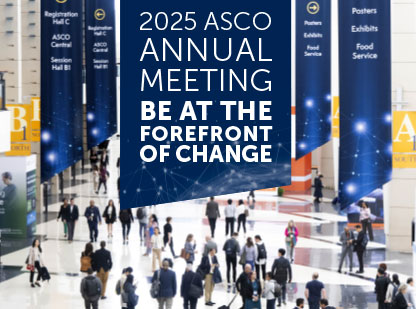Korean pharmaceutical and biotech companies are set to present major research milestones at the 2025 American Society of Clinical Oncology (ASCO) Annual Meeting, taking place from Friday to Tuesday in Chicago.

ASCO, one of the world’s three leading cancer congresses alongside AACR and ESMO, brings together more than 40,000 researchers, clinicians, and industry executives each year to discuss the latest in cancer treatment and clinical development.
This year, several Korean companies will unveil new clinical data and early-stage designs spanning immunotherapy, targeted therapies, and AI-driven biomarker platforms.
While the number of poster presentations by Korean firms has slightly declined compared to last year -- largely reflecting a tougher R&D funding climate -- industry experts say the quality and maturity of the data remain high.
In addition to formal scientific presentations, many of these companies will also engage in business development meetings with global pharmaceutical partners to pursue licensing deals, joint development agreements, and regional commercial partnerships.
Among the companies presenting clinical results is LG Chem, which will showcase phase 3 data for Fotivda (ingredient: tivozanib), its targeted therapy for metastatic renal cell carcinoma, developed by its U.S. subsidiary AVEO.
The trial examined Fotivda both as monotherapy and in combination with Opdivo (ingredient: nivolumab) following prior immune checkpoint inhibitor-based treatments.
Results demonstrated favorable progression-free survival in the monotherapy arm, particularly among patients who had previously received Yervoy and Opdivo. AVEO will also present phase 3 data on ficlatuzumab, an HGF-targeting antibody in head and neck cancer, and phase 1b data for AV-380, an anti-GDF15 antibody in development for cancer cachexia.
ImmuneOncia, a joint venture between Yuhan Corp. and Sorrento Therapeutics, will report interim data from a phase 1b trial of IMC-002, a CD47-targeting monoclonal antibody tested in combination with Lenvima (ingredient: lenvatinib) in patients with advanced liver cancer.
The study showed an objective response rate of 30 percent and a disease control rate of 70 percent among 10 evaluable patients, with a median time to progression of 8.3 months.
Additional AI-based analysis revealed significantly stronger responses in tumors with low off-target CD47 expression, highlighting the potential for predictive biomarker refinement.
Another presentation will come from Idience, a subsidiary of Ildong Pharmaceutical, which will report updated phase 2 results for venadaparib, a PARP1 inhibitor being tested in third-line metastatic gastric cancer patients.
Among those with homologous recombination deficiency (HRD) mutations, the drug combined with irinotecan achieved an overall response rate (ORR) of 35.7 percent and a median progression-free survival of 5.6 months.
TiumBio will present interim phase 2 data on TU2218, an oral dual inhibitor of TGFβ and VEGFR2, tested with Keytruda (ingredient: pembrolizumab) in patients with bile duct and head and neck cancers.
The company aims to expand TU2218’s indication into first- and second-line therapy for solid tumors where survival outcomes remain poor and new options are needed.
Abion will present results from a phase 2 study of ABN401, a MET-selective inhibitor under investigation in MET-altered non-small cell lung cancer. The drug showed an ORR of 43.2 percent and a disease control rate (DCR) of 97.3 percent in monotherapy.
Onconic Therapeutics, a subsidiary of Jeil Pharmaceutical, will present two trial designs for its investigational dual-target PARP inhibitor, nesuparib.
One study is focused on metastatic pancreatic cancer, and the other is an investigator-led phase 2 trial in endometrial cancer evaluating nesuparib with Keytruda. Both studies aim to address indications with high unmet needs and limited therapeutic options.
Early-stage trial designs will also be presented by Ligachem Biosciences, which is jointly developing an ADC candidate, LNCB74, with U.S.-based NextCure. The program targets B7-H4 and is currently in phase 1.
Aptabio will present the design of a first-in-human study for APX-343A, a novel immunotherapy in development for advanced solid tumors, both as monotherapy and in combination with Keytruda.
Lunit, a Korean leader in AI-powered pathology, will present 12 abstracts this year -- more than any other AI firm participating at ASCO 2025.
Key data include a study in collaboration with Japan’s National Cancer Center evaluating HER2 expression in biliary tract cancer and predicting response to Enhertu (ingredient: trastuzumab deruxtecan). Lunit’s SCOPE platform showed that membrane-specific HER2 expression more accurately predicted treatment outcomes than traditional intensity scoring.
Another abstract highlights a new AI model to predict CLDN18.2 expression from standard H&E slides in gastric cancer patients, offering a practical solution to guide targeted therapy without the need for additional tests.
Yuhan’s out-licensed EGFR TKI lazertinib (marketed as Leclaza in Korea and Lezcluze in the U.S.) will also be featured in presentations by Johnson & Johnson, including data from the COCOON trial exploring dermatologic adverse event mitigation strategies.
Daehwa Pharmaceutical is presenting results for an oral formulation of paclitaxel in metastatic breast cancer, while CG Invites and Boryung are highlighting oncology platforms focused on cancer vaccines and immunotherapy.
Several other Korean companies are attending ASCO 2025 for partnering opportunities, including Hanmi Pharmaceutical, HK inno.N, GI Innovation, and Orum Therapeutics.
Meanwhile, government-backed agencies such as the Korea Drug Development Fund (KDDF) and the Korea National Enterprise for Clinical Trials (KoNECT) are participating to support international networking and promote Korean innovation pipelines under the Korea Pavilion.
Related articles
- Daehwa Pharm to present phase 3 trial results of Liporaxel for breast cancer at ASCO
- Lunit to unveil 12 AI-powered oncology studies at ASCO 2025
- [ASCO 2024] New subcutaneous Rybrevant boosts US entry prospects for Leclaza
- [ASCO2024] Moderna's individualized neoantigen therapy shows broad efficacy in cancer treatment
- [ASCO 2025] What is Hanmi's next-gen onocology development strategy?
- Lotte Biologics taps Takeda spinoff, ADC startup Kanaph for next-gen platform buildout
- Daehwa Pharm scores Chinese nod for Alzheimer's treatment patch
- Orum Therapeutics to present ORM-1153 preclinical study in US
- TiumBio’s TU2218 combination shows 82% disease control rate in phase 2 head and neck cancer trial

